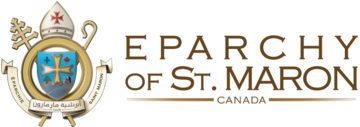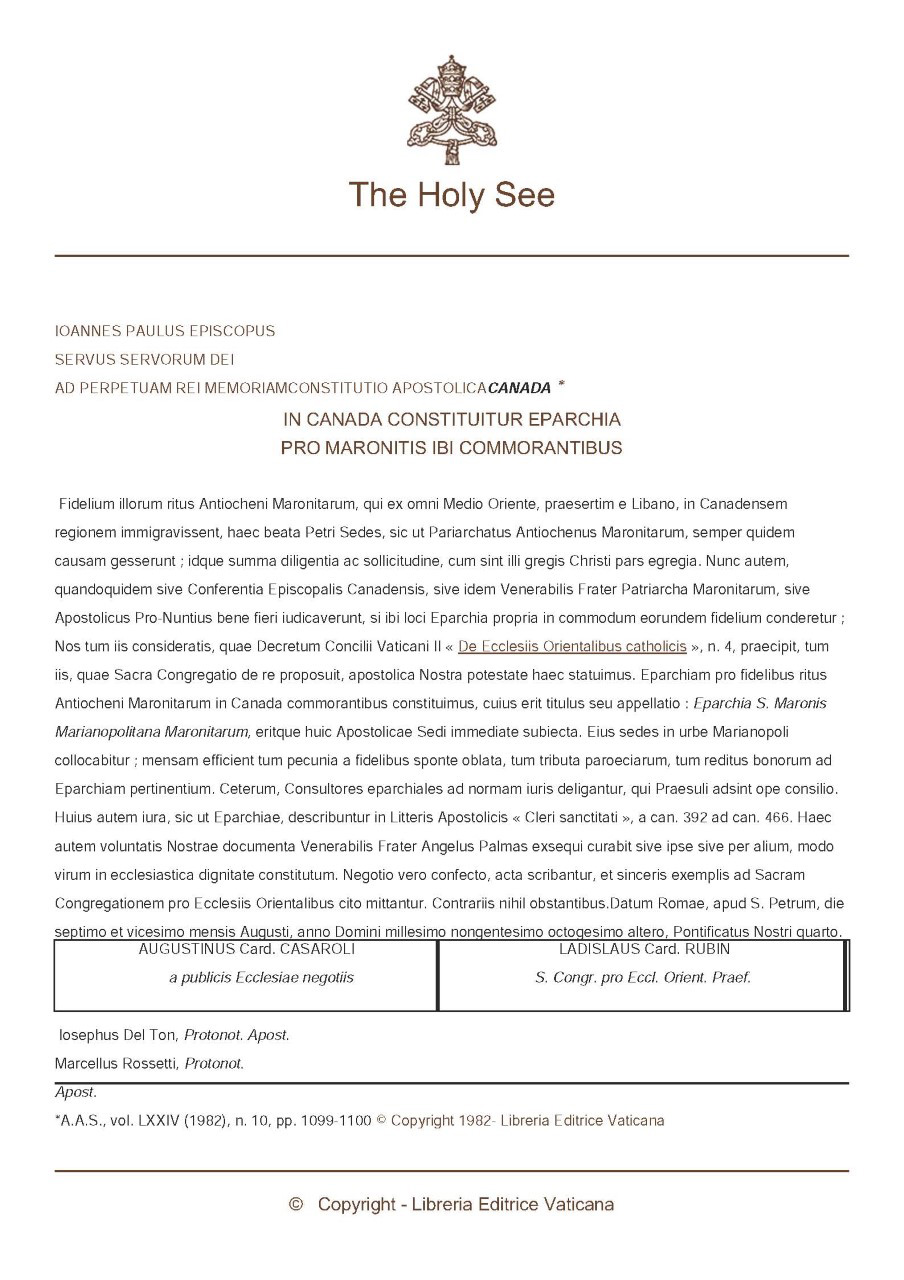History of the
Ecclesiastical and Governmental structure
It was in 1982 that the Holy See judged that it was the right moment to intervene with the Maronites of Canada and founded in Montreal and for all of Canada, Saint-Maron’s Eparchy. The first bishop was Bishop Elias Shahin. Bishop Georges Abi Saber succeeded him in 1990. The latter withdrew from the pastoral government of the Eparchy in 1996. Between the two mandates, there was a period of two interim administrations: that of the Choriane Elias El Hayek vicar general of Bishop Chahine, who had also filled the office of apostolic administrator, and that of KhairallahAoukar, vicar general of Bishop Abi Saber. In February 1996, Archbishop Joseph Khoury, former official of the Holy See to the congregation for Eastern churches and apostolic visitor to the Maronites in Europe, was sent to Canada as apostolic administrator, and on November 24th, 1996 he was appointed Ordinary Bishop of the diocese.
On February 5, 1996, the Holy Father accepted the resignation of Bishop Abi Saber and appointed Bishop Joseph Khoury as Apostolic Administrator of the Eparchy. Bishop Abi Saber retired from the administrative position of the eparchy and returned definitively to Lebanon. The arrival of the apostolic administrator in Montreal made it possible to ensure the government of the Eparchy as a result of this resignation.
The action begun by Monsignor Khoury (first apostolic administrator for a year and then Bishop) who wanted to create the necessary structures of the central government and to revise the structures of the parishes by relaunching the trust and interest of the faithful towards their Church. It was also necessary and important to harmonize the Maronite pastorate with that of the local church by building good relations with the Archdiocese of Montreal. There is also the prestige and good reputation of the Maronites in maintaining good relations with the Catholic and Orthodox sister churches, as well as with the Muslim leaders of the Middle East.
In a multi-confessional and multicultural country like Canada, ecumenism encompasses large dimensions. With regard to the Maronite community, it was necessary to encourage fraternal encounters with the Eastern Catholic and Orthodox communities present in Montreal. Interreligious dialogue with Muslims is limited for the moment to meetings of a social nature. Religious leaders are regularly invited to feasts at the bishop’s headquarters, just as it pleases the leader of the Maronites to participate in the festivities of the Muslims. Convinced that the dialogue between religions is a daily experience, the Lebanese have supported the initiatives of the Maronite Bishop that foster a spirit of understanding and collaboration among the various Eastern religious communities in Canada.
Accustomed, like all Lebanese to integrate easily into his new social and cultural environment, the new eparch joined the Canadian Conference of Catholic Bishops and, even better, became president of the Commission of Canon Law Inter-rites, and therefore moderated the ecclesiastical courts in Canada. In parallel, Bishop Khoury taught Oriental Law at Saint Paul University in Ottawa.
First Priestly Ordination in Canada
On the eve of the Feast of the Immaculate Conception in 1997, the first priestly ordination was conferred on Canada to a Maronite priest who completed his training at the Seminary of Montreal. As part of vocation ministry, the Eparchy wanted to present this event as a starting point to relaunch the call to young people who eventually hear the call of the Lord.
We must point out the obligation of the Mother Church to make effective commitments to provide qualified personnel for the church of emigration. In some countries, and especially in Canada, where pastoral care has characteristics specific to the American continent, mandated that the priests must know the languages and have adequate training and, above all, have a deep missionary spirit.
The Justice Service at the Ecclesiastical Tribunal
During the 1999 annual retreat, the priests of the eparchy renewed their desire to see their own church take responsibility for providing justice for its own faithful. They stressed the need for a family reconciliation committee. This pastoral work became more and more urgent to reconcile the families before bringing their complaint before the court.
The Eparchy can now count on qualified personnel for the management of its own court, duly constituted. The creation of this new institution is certainly part of the reorganization of the eparchial curia, but it is used above all for the Eparchy to return to the service of the faithful and to renew pastoral relations, which are particularly delicate in this field.
The information body
The Saint Maron Diocese today has its own information center that promotes knowledge of its spiritual and cultural heritage and strengthens the links between the different members of the community. Following the technological evolution of the third millennium, the Eparchy built its own website at www.stmarouneparchy.ca.
It should also be noted that each of the Maronite parishes in Canada is equipped with its computer system to reach all interested parties in the immense country of Canada.
A Pastoral Care for the Great Challenges
The evangelization of the faithful is intimately linked to the direct pastoral action based on the administration of the sacraments and a preaching, centered around the Gospel and which follows an appropriate and explanatory catechesis. Pastoral visits are always the best way to better understand the pastoral situation of the community members.
Moreover, it is easy to see that the Maronites who have recently arrived in Canada are exposed to the problems affecting North American countries: family morals, civil divorce, free marriages, restriction of the family nucleus, loneliness of the elderly and non-active, the isolation imposed on persons taken by the work regime in place. All these constitute a great change of morals and of social and personal ethics, which require of the Church a new pastoral strategy.
On the other hand, anti-Christian movements (Freemasonry and Jehovah’s Witnesses) are increasingly infiltrating the ranks and threatening to undermine the morals and faith of many Christian believers, often fragile and fragmented; Mixed marriages are becoming more and more frequent. On the social level, there is a feverish activity of the political parties in Lebanon, some members of which have left the country and settled in countries of emigration. They regroup, they organize themselves and begin to create cells of encounters. Visits of some Lebanese leaders abroad bring back the nostalgia of the past.
All these constitute challenges to be faced by the Maronite Church in Canada and by the eparchial Bishop.
A clergy with multiple requests
The Maronite clergy in charge of pastoral care in Canada comes exclusively from Lebanon. In addition to the diocesan priests, there are two religious orders: the Lebanese Maronite Order in Montreal and the Maronite Order in Ontario (Windsor and Toronto) long before the founding of the Eparchy. All the parishes are served by a resident priest. In Calgary, Edmonton and London (Ontario), the pastoral service is for the moment occasional because of the lack of priests (to check if it is still current).
The situation of the Maronite clergy in service is quite peculiar. Above all, it should be noted that the priests have made great efforts to keep the community united, especially outside of Montreal.
Parishes without borders
The Maronite parishes in Canada cannot have the structure known to them elsewhere, since they are distinguished by their immense geographical extent. The difficulties they encounter are often difficulties of relationship between the different pastoral agents as well as those caused by the mobility of the faithful, as is the case in Windsor and Montreal.
Indeed, this mobility does not facilitate the task of defining geographically the parishes in order to make them territorial.
As an introduction to the general presentation of Maronite parishes in Canada, it should be noted that all Maronite communities are organized in their pastoral, social and cultural activities almost everywhere in the same way. Pastoral activities consist of evangelical vigils, youth movements, Marian congregations, associations of volunteers, scout movements, teaching of catechesis to children, choir, preparation for first communion, preparation for marriage and baptism, cultural associations, courses at the parish for the teaching of the Arabic language.
Almost everywhere, the parishes face the same difficulties: the problem of linguistic communication at the level of the liturgy, catechesis and parochial meetings, the dispersion of the faithful, Sunday work and the race for well-being, isolation or the anonymity of the parishioners, the lack of places of worship especially in large cities like Montreal, Toronto, Edmonton, Calgary, etc.


